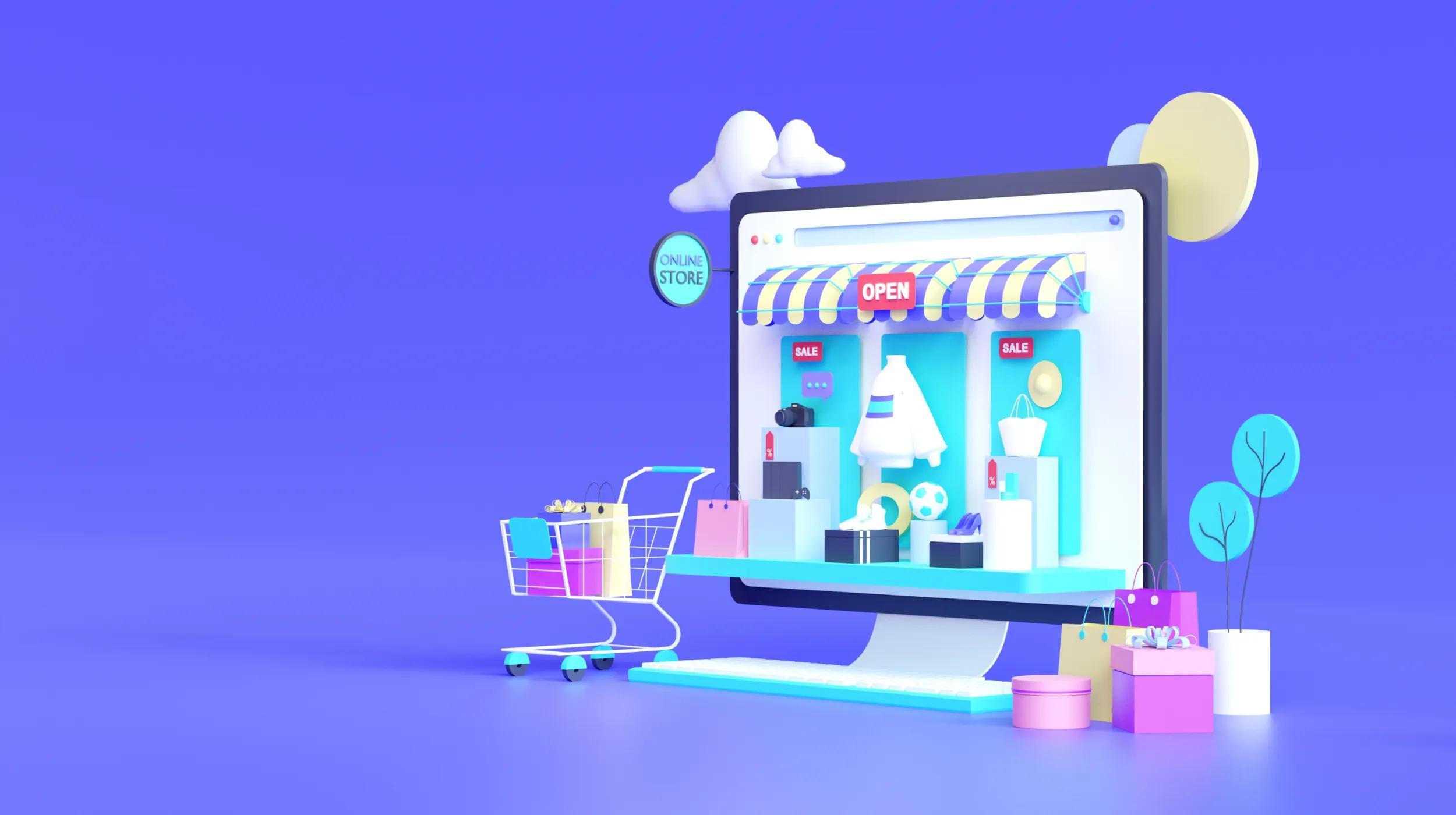It’s no secret that online shopping is wildly popular among consumers across the globe. In fact, 2.71 billion people worldwide shopped online in 2024 (that’s 33% of the entire world’s population), including more than 80% of all adults in the United States (273 million). Overall, 57% of global consumer spending is done online. That’s a major reason why global online retail sales are projected to reach nearly $7 trillion (yes, trillion!) in 2025, with expectations that they’ll hit $8 trillion by 2027.
With these staggering statistics in mind, ecommerce presents some amazing opportunities for entrepreneurial types who might be looking to start a business this year. The question is, what should that ecommerce business be? After all, there’s a seemingly unlimited number of online shopping options. But there’s undoubtedly an ecommerce business idea for you. We’ll help you decide with our list of 20 ecommerce business ideas for 2025.
Best online ecommerce business ideas
With online shopping booming around the world, now is the perfect time to get in on the action. And while some people may be intimidated by the thought of starting their own ecommerce business, creating an online store is actually much easier than you might think. Now it’s just a matter of deciding… what do you want your business to be?
Pro tip: Make sure you check into business-related tax laws in your state so your new ecommerce business is fully compliant - learn how to register a business in any US state.
Without further ado, here are our top 20 ecommerce business ideas for 2025.
1. Subscription boxes
There’s a simple reason subscription boxes can be an ideal subscription-based business model for ecommerce if you’re looking to bring in consistent revenue: the recurring need of your customers for the products you’re selling.
With a subscription box, customers are billed monthly - until they cancel - for a box of curated items you send them. How many subscriptions do you still pay for because you simply forgot to cancel them (hello, Netflix)? Those uncancelled subscriptions equal consistent revenue for any subscription-based business. A perfect example of a physical product is the highly successful Dollar Shave Club subscription box business.
Beyond neglected cancellations, however, the key to a thriving subscription box ecommerce business is choosing a niche that already has some marketplace traction. Some popular categories include food and drinks, wine, pet products, personal care, collectibles, games, household goods, and books. You just need to find one that works best for your business goals – find out how to find your niche market idea.
Related: How to price products
2. Candles and fragrances
Fragrances and scented candles really are the perfect gifts for anyone. Do you always have a candle burning? Have you tried combining fragrant oils to create a new scent? Maybe you’ve dabbled with DIY candle kits. If so, starting a fragrance-focused business might be ideal for you.
There are plenty of candle and fragrance ecommerce businesses out there, so it’s important to find your niche when creating the business. A few ideas to keep in mind:
- Are your scents unique? Consider experimenting with new smells by mixing fragrances and creating something that stands apart from the rest.
- Design matters. Beyond the scent, shoppers love candles that fit with their decor. Maybe you can partner with a local artist to use handmade ceramic pots. Offer a variety of vessels for your candles so there’s something that fits every customer’s aesthetic.
- Have something to say? Give your candles and fragrances a clever label to help set them apart. By focusing on certain niches and adding the right messaging, candles and fragrances become very personal gifts. Funny labels are always a hit (think something like “This Is My Leave Me Alone Scent”), as are those geared toward people with certain passions or professions.
- How much? You’ll want to establish a price range that falls in line with your competition. Not sure what the right price point is? We can help you figure out how to price your products.
However you want to position your candle and fragrance ecommerce business, it’s critical to find the “special sauce” that makes your products different from what the big retailers currently offer. Make sure you also choose the best business entity for your store before you start selling.
3. Personalized products
There’s always thought behind a personalized gift. And what gives personalized product businesses so much potential is that nearly everything can be personalized. You know all about personalized T-shirts, hoodies, and mugs. But an ecommerce business focused on personalized products can go way beyond the typical offerings.
How you’ll stand out from the crowd is by selling items you won’t find on most personalized product websites - 3D sculptures, Crocs, puzzles, and sneakers, for example. Get creative with your offerings, then see what’s working and what isn’t - you can always adjust your product selection. Engraved items - from watch faces to picture frames - are also a big hit, so it might be worth your while to offer engraving services.
If you want to dip your toe into the waters before launching your own ecommerce business, selling on a platform like Etsy is a great test-run. This allows you to determine which items are selling versus which ones you may want to remove from your assortment. That way, when you launch your own website, you’ll have a solid selection of products from which to start.
4. Stationery
Yes, we’re firmly entrenched in the digital age, but there’s still a market for stationery and office supplies. It might surprise you that the stationery products market was valued at $147.5 billion in 2024 and is projected to keep growing. Here are some items you can offer:
- Paper and stationery: This includes all types of paper stock and specialty paper, notepads, sticky notes, and envelopes. Personalized stationery also makes a thoughtful gift.
- Notebooks and journals: Consider journals and notebooks with designer covers and different sizes.
- Pens and office supplies: Calligraphy and fountain pens remain popular gifts, and everyone needs tried-and-true ballpoint and gel pens. Mix in some different types of pencils (mechanical, colored, etc.), markers, highlighters, erasers, and pencil sharpeners to create a well-rounded selection.
- Gifting items: This can include greeting cards, thank you notes, and even wrapping paper.
- Desk accessories: Calendar desk pads, tape dispensers, scissors, staplers--all essential for a home office!
- Art supplies: From art paper to specialized pens and pencils to watercolors, art supplies can be a reliably popular offering.
As with any online business, stay on top of the trends and be sure to showcase the items you know will sell.
5. Pet products
There’s a lot of competition out there when it comes to pet supplies. Big-box stores like PetSmart and Petco. Online giants such as Chewy and Amazon. If you’re a pet lover looking to start a pet supply ecommerce business, it’s important to plan how you’ll establish yourself as a destination for fellow pet parents.
This is where finding your niche is critical. Every pet store offers food, grooming supplies, toys, wellness items, furniture, and apparel. How will your products stand out?
- Personalize them. Offer customization for pet clothes, water and food bowls, and furniture to give typically generic items a fun, personal touch.
- Find your niche and run with it. If you can dig into a specific subcategory of pet items and make it uniquely yours, you’re more likely to experience success.
- Offer homemade/natural items. If you’ve dabbled in making wholesome food or treats for your own furry friends, share it with the world! Pet owners want food with healthy, natural ingredients and sustainable materials. They could be differentiators in a saturated market.
6. Niche grocery items
A constantly growing segment is niche grocery items. Shoppers with specific needs or preferences tend to gravitate toward niche grocery items whether it’s to accommodate their wellness and diet routines, their ethical and cultural beliefs, or simply their love of new types of foods that may not be easily accessible in your neighborhood grocery store
A few categories to consider for a niche grocery ecommerce business:
- Diet: Make and sell items that cater to those with vegan, vegetarian, keto, gluten-free, kosher, nut-free, and/or diabetic diets.
- Ethnicity: Specialize in certain ethnic foods? Make that your niche! Focus on a specific cultural palate – check the neighborhood markup and don’t target the top ones. You’re sure to have a Mexican or Chinese store around, but have you seen a Romanian or Turkish one? Research to break into the best niche.
- Source-based: If you’re a firm believer in a diet that solely consists of organic and locally sourced food, narrow your store’s selection to these types of items.
- Your own recipes: Maybe you make a mean vegan cheese, or you create your own microbrews. Share your original concoctions with the world!
7. Sell your services
Got a special skill or talent that others could pay you for? Market it and sell it! If you’re a freelance graphic designer, writer, consultant, or tutor, perhaps you’ve been working some side hustles from home to make a little more money. Well… think bigger than a side hustle!
Why not turn your specific skills and part-time freelance jobs into a full-time business? Some professions and skillsets are tailor-made to be sold as an ecommerce business. We mentioned writing and designing, but this niche also includes SEO expertise, web design and development, photography and videography, language translation, editing, personal training, and many more.
8. Special event food items
Special events require special food. Why not be the business that provides it? If you’ve always wanted to bake or cook for a living, creating an ecommerce business that specializes in occasions or special events can be a very successful endeavor.
Focus your efforts on weddings, birthdays, religious celebrations, engagements, baby and bridal showers, graduations, and even corporate events. And narrow your offerings to your expertise, whether that’s cakes, cake pops, cookies, other dessert treats, dips, appetizers, and other specialty dishes. No need to start a whole catering business - creating your own special event foods ecommerce business is a solid niche to settle into. Before going out to events, make sure you pick the best payment methods for you and your business.
Related: Learn how to make a fun logo for your business here.
9. DIY kits
Do-it-yourself kits are not only ideal gifts, they’re also appealing to shoppers who are interested in exploring certain crafts or hobbies without pouring too much money into it. By packaging items into DIY kits, you can form a solid customer base that comes back to try out something new or gift your kits to friends and family.
Some DIY kits that are popular sellers:
- Make your own storybook
- Origami
- Candles
- Painting
- Air-dry clay pottery
- Crochet
With the right product selection and some successful marketing, you can build a DIY kit ecommerce business that thrives.
10. Print-on-demand products
Print-on-demand (POD) business models have the potential to be wildly successful. With a POD ecommerce business, you design the products - such as clothing, drinkware, and accessories - and list them on your website or sales platform. The most appealing aspect of a print-on-demand business is that you have no inventory.
This inventory-free model makes selling POD products ideal if you’re starting an online business. When a customer places an order with your business, the third-party print-on-demand service partner you choose prints, packs, and ships the item right to the customer.
This process is more cost-efficient, involves less lifting for you, and gives you full control over what your products look like. Find out what some of the more popular print-on-demand products are so you can start planning now.
A POD business is a form of dropshipping, and it can be highly profitable, whether you choose to partner with a print-on-demand supplier or sell within an online marketplace like Etsy or Amazon. GoDaddy can help you grow your print-on-demand business by building a beautiful, fully operational ecommerce website.
11. Photography
Skilled photographer? Turn a hobby into a profitable ecommerce business by selling both your photos and your services online. You can earn steady income by regularly photographing weddings, birthdays, anniversaries, and other special events. If that’s not your thing, consider selling your own photos. Shoppers will pay for unique, one-of-a-kind photos, so load your best shots onto your website and sell them in a variety of sizes and formats. In fact, you can partner with a print-on-demand supplier that can put your photos on just about anything!
Another idea is to add your photos to stock photo sites, many of which will pay you each time your photograph is downloaded or licensed from their site.
12. Upcycled furniture
Refurbishing and redesigning furniture items can not only make you money, but it’s also quite fun if you’re a bargain hunter who loves to recreate the look of these previously owned items. Upcycled furniture is very popular with shoppers who appreciate sustainability and love finding that perfect unique item.
Revolve your website’s messaging around sustainability and the idea that the pieces that you’re selling are literally one of a kind - creating this type of demand can also justify higher price points. As always, share some of your favorite projects on social media to build some marketing buzz and drive traffic to your business – our social media guide can help.
13. Niche fashion and apparel
There are literally thousands of websites that sell apparel. But that shouldn’t stop you from creating your own fashion ecommerce website. Look at it as a challenge to find your niche.
Zero in on a particular market or demographic that you’re familiar with and run with it. That niche could be clothes made with sustainable fabrics, petite or plus-sized apparel, or specific styles - streetwear, athleisure, steampunk, or artsy, for example.
Take advantage of social media and show off your designs to all your friends and followers. If you can grab an influencer’s attention and have them post one of your designs, business could really start booming.
14. Handmade crafts
Speaking of one-of-a-kind items, handmade crafts are often highly sought-after items because no two items are exactly alike. Starting your own handmade craft ecommerce business is a potentially profitable way to share your creativity, especially when you understand the basics of selling crafts online either through an online marketplace like Etsy or on your own website.
Offering the option of customizing each item presents shoppers with another value-added benefit to purchasing your handmade crafts. Keep the focus of your business on the specific types of crafts you’ve mastered--whether it’s woodworking, ceramics, or glass-making. Then allow your customers to add names, dates, or other personalized messaging to your design to create the perfect gift or keepsake.
15. Used music, movies, books
There’s always a robust market for entertainment, and shoppers - especially those who love vintage and retro items - are always on the hunt for a missing piece in their collection. With the recent rebirth of vinyl records, CDs, and, to a lesser degree, cassette tapes, used music presents many opportunities, despite the infinite music selections available digitally.
Similarly, while digital streaming services present a never-ending library of movie and TV titles that are easily accessible with just a click, there’s a significant segment of shoppers who strongly prefer physical media. Blu-ray Discs, DVDs, and even VHS tapes (for the truly nostalgic) remain popular buys.
Now, your used media ecommerce business may not generate very high profit margins, but, if you know where to look (estate sales, yard sales, classified ads, online selling communities), you can readily find bulk lots of records, CDs, DVDs and Blu-ray Discs, and books priced to sell.
16. Sports trading cards
From around the 1950s through the 1990s, collecting sports trading cards was the go-to hobby for most kids and young adults. However, as the market grew and more card variants were introduced--and packs of cards grew more expensive--the industry experienced a lengthy lull. Until COVID. In 2020, as people searched for ways to pass the time, the sports card industry exploded. And while it has calmed a bit since then, it remains a lucrative business. In fact, the sports trading card market was forecasted to grow by $9.7 billion between 2023 and 2028, with a 17.61% CAGR during that forecast period.
And while most cards sell at modest prices, there are some rare ones out there that can literally make an entire year for a business. Aside from the Mickey Mantles and Babe Ruths that can fetch millions of dollars, some recent cards have netted tens of thousands of dollars.
For example:
- A 2018 Bowman Chrome Shohei Ohtani Red Refractor card sold for $900,000.
- And the 2024 Topps Rookie Debut Patch Autographed Paul Skenes 1-of-1 card recently sold for $1.11 million.
While it may require an extensive collection and/or upfront capital to get your venture started, a sports trading card ecommerce business could prove to be quite profitable in the long run.
17. Eco-friendly household items
Contributing to environmental awareness - and the preservation of the environment itself - is always a noble endeavor. Starting your own ecommerce business that exclusively sells eco-friendly products for the home not only positions you as a brand concerned about our planet, but it also gives you a solid niche within the larger household goods items market.
There are plenty of biodegradable and eco-friendly items that are in demand, such as bags, cleaning products, food containers, solar-powered devices, diapers, and even jewelry.
18. Collector’s items
Similar to sports trading cards, collector’s items are always in demand. You could set up a collectibles ecommerce business with a variety of item categories, but you may be better served sticking to a specific area and really focusing on curating your inventory. Some of these collectibles are highly desirable:
- Funko POP figurines: These vinyl figures are essentially stylized versions of movie and TV characters, athletes, musicians, and other noteworthy personalities. Some Funko POP figurines are limited in quantity and tough to track down, which makes them quite valuable.
- Comic books: Those precious first editions and historical issues are no doubt cherished items, but these comic books are also very valuable. Even if vintage or rare comic books aren't your focus, an all-encompassing comic book ecommerce shop can be quite successful as you cater to all comic fans.
- Sports memorabilia: Autographed and game-used memorabilia are hot items for sports fans. If you’re able to obtain pieces like these, they can be sold at a premium.
- Retro and vintage toys: As many shoppers pine for the good old days, the games and toys they played with allow them to relive their childhood memories. There’s a significant niche market for original vintage toys such as Star Wars action figures from the late 1970s and early 1980s, G.I. Joe toys, Cabbage Patch Kids, Teenage Mutant Ninja Turtles, and so many more dating even beyond the ‘70s.
19. Online courses
Have some expertise to share? Do so while earning some money by selling online courses. For example, if you’re especially skilled at playing the guitar, create a video course that teaches prospective learners everything from the basics to advanced concepts. People want to learn new skills, and you’re providing them the means to do so.
Selling online courses offers the built-in benefits of minimal overhead (all you need is high-quality audio and video equipment, good lighting, and a computer) and even less time - once your videos are recorded, you simply send the file to your customers. No shipping, logistics, and out-of-pocket costs.
Once your business is established, you can then expand your services to monthly subscriptions for multiple lessons, a series of online course sessions, and even livestream experiences.
20. Original art
Like photography, if you’re a skilled artist, especially with a unique aesthetic, you can really grow a customer base by selling your art online. Whether you’re adept at painting or sketching, shoppers are always on the lookout for interesting and different decor offerings.
No matter what type of art you create, consider combining your designs with the print-on-demand business model we mentioned earlier.
Get your ecommerce business started in 2025
Which ecommerce business is right for you? Take your interests, talents, and passions into consideration, then find your niche with products you’re confident about selling. Once you make that important decision, determine which business model is right for your store. Along the way, do plenty of research, identify your audience, market your brand, and work hard--then watch your ecommerce business take off.
Frequently Asked Questions
How can I start an ecommerce business?
You have a couple of options - create your own ecommerce business from pre-built website templates with tools like GoDaddy's website builder. When starting your ecommerce business, it’s important to first decide on the best business entity for your store (sole proprietorship, partnership, limited liability corporation [LLC], or corporation). Then you’ll need to address any potential legal issues, such as creating your website’s terms and conditions and privacy policy, taxation on your online sales, marketing and advertising compliance, product safety and liability, shipping and delivery policies, cross-border ecommerce compliance, accessibility and discrimination, and more. Consult with an attorney before launching your ecommerce business to ensure all your bases are covered.
How can I make an easy ecommerce store?
As we mentioned, you can start an online store with the help of GoDaddy’s store builder as well as our Managed Hosting for WooCommerce and the amazing GoDaddy Airo™, our AI-fueled, customizable website experience that’s included with any domain. Learn more on how to start an ecommerce website here.
How much does it cost to start an ecommerce business?
Believe it or not, you can actually start an ecommerce business for as little as nothing as long as you have a computer and an internet connection. Eventually, you’ll need to consider legal costs (generally hundreds of dollars at minimum), marketing and advertising expenses (plan on hundreds of dollars per month), inventory costs (depending on your business model), staff (if you plan to hire help), taxes, and other overhead costs. Check out our article on the costs of starting a business for more in-depth details.
How do I choose an ecommerce platform?
There are several ecommerce platform providers out there… but who’s the best? You’ll want to compare features like:
- Credit card payment processing rates
- Built-in marketing tools
- Size limits per digital products
- Product limits
- The ability for clients to book classes and appointments
- Chatbots
- Analytics dashboard
- Point-of-sale tools
There are plenty of reasons to pick GoDaddy – but check out the best online shop builders comparison table to make your choice today.






